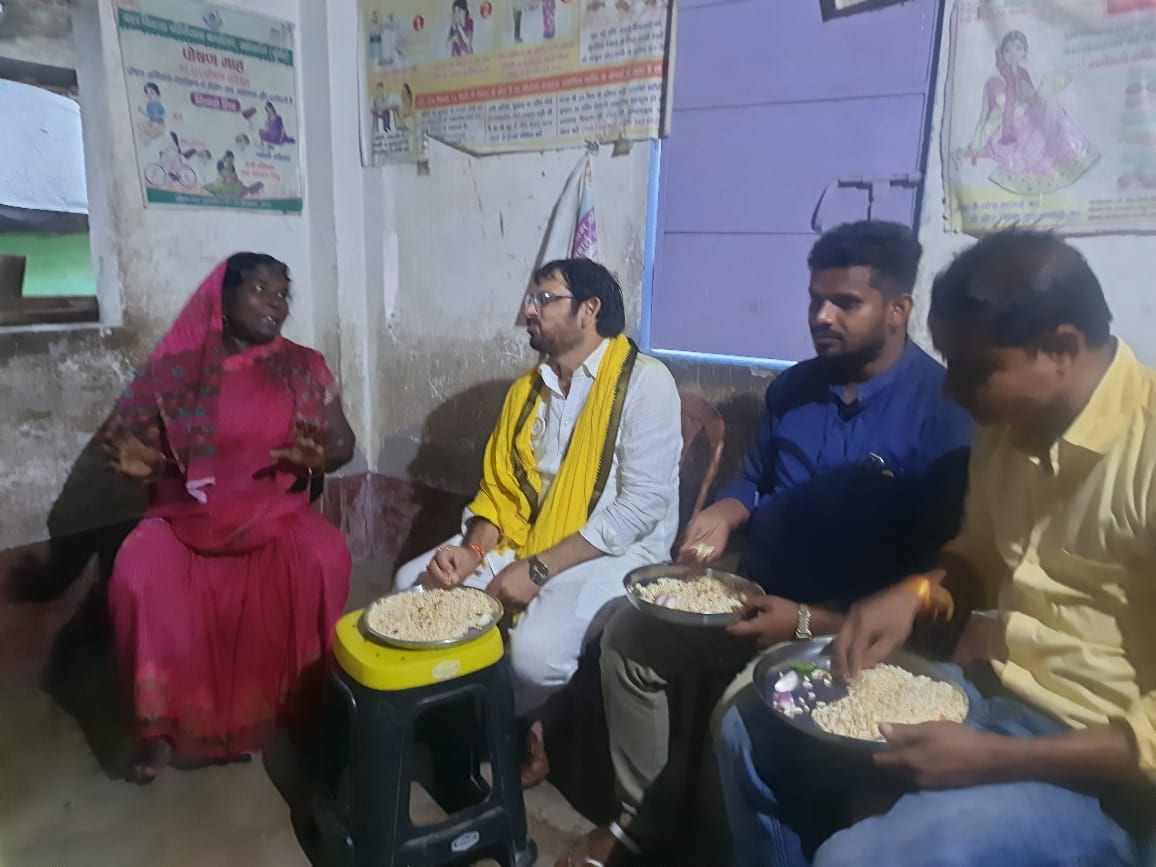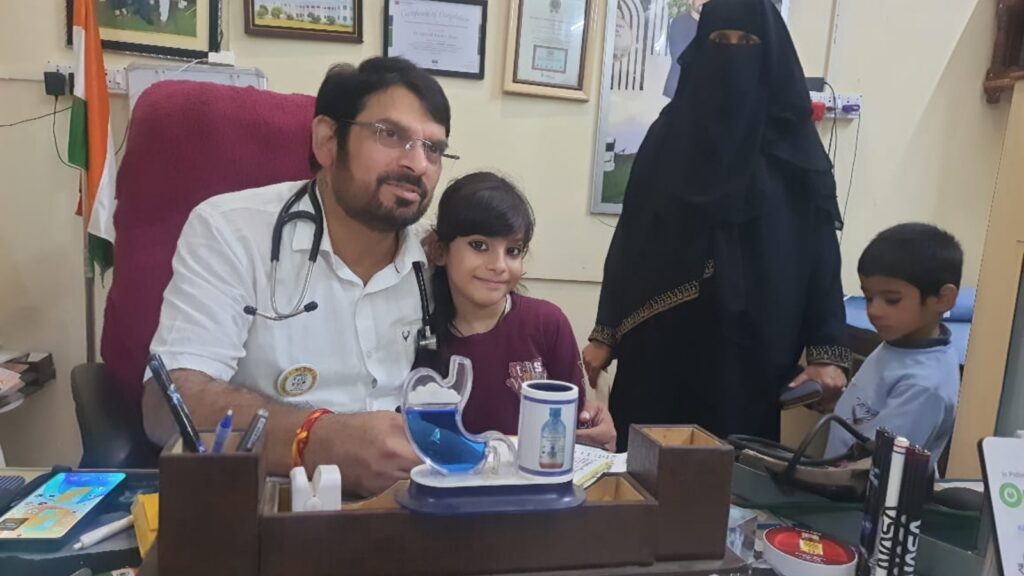Keeping his guns trained on BJP leader and Deputy Chief Minister Samrat Choudhary over his age and education, Jan Suraaj founder Prashant Kishor has fielded Dr Santosh Kumar Singh, 48, to take on Choudhary in his Tarapur constituency in Munger district in the upcoming Bihar Assembly elections.
A popular physician, Singh has been practising medicine for 12 years, including five years in Tarapur. A resident of Munger’s Paharpur village, he completed his MBBS in 2011 before pursuing his two MD degrees.
While Singh has not interacted with his BJP rival during the current campaign, among his notable patients are the late Parvati Devi, a former Tarapur MLA, and six-time Tarapur MLA Shakuni Choudhary, who are Samrat Choudhary’s parents.
 Singh interacts with Jan Suraaj supporter Meena Devi in Chorgawa village.
Singh interacts with Jan Suraaj supporter Meena Devi in Chorgawa village.
Though Singh would regularly speak to Shakuni over the phone, these interactions stopped after the former joined the Jan Suraaj in July 2024.
With less than a week to go before voting in Tarapur in the first phase on November 6, Singh continues to see patients even as the campaign heats up.
It is 9 am on October 31, and already a line of patients has formed at Singh’s private, 10-bed nursing home in Tarapur’s Fazeliganj.
By 10 am, Singh begins seeing his patients. Six-year-old Khwaish, who Singh fondly calls his “adopted daughter”, is at the clinic with her mother Nazia, seeking treatment for cough and cold. Singh, who gets patients from over 200 nearby villages, says the local residents mostly report seasonal fevers, anaemia, dengue, loss of glucose among newborns, and urinary tract infections among women. Though his consultation fee is Rs 400, he waives it for poor patients.
At 10.30 am, Singh is joined by his wife Khushbu, who has been campaigning for her husband. “Initially, I was averse to the idea of my husband contesting, but now I am overwhelmed to see the respect for him in the field. While campaigning, I talk of Prashant Kishor’s vision for Bihar and how my husband can add value to it as a doctor,” she says as Singh puts the trademark yellow gamchha around her neck, marking her as a “true Jansuraaji”.
Soon afterwards, Shubham Kumar Shukla, the party’s Tarapur Assembly in-charge (AI), enters the clinic to discuss the day’s campaign plan with Singh.
Shubham, a graduate from Uttar Pradesh, is part of the Jan Suraaj’s “professional team” or JSPT. Explaining the party’s internal structure, Shukla says, “Besides the usual political setup like any party, we have a parallel professional structure. At panchayat level, we have local political representatives (LPRs), who coordinate with their political counterparts or panchayat adhyaksh. The LPR reports to the AI, who coordinates with his political counterpart, the Vidhan Sabha prabhari. The AI’s job is to provide campaign content, monitor the day’s activities and report it to the district in-charge (DI), who reports to the zonal in-charge (ZI). The ZI reports to the state in-charge (SI), who is Prashant Kishor.”
Broadly, the Jan Suraaj has two verticals – political and professional – with the objective of “bringing professionalism to campaigning”. However, the structure has been facing internal conflict, with members of the political teams often complaining of “interference” from their professional counterparts.
At 11 am, Tarapur Vidhan Sabha prabhari Ashish Prabhat enters the scene. His job is to provide local contacts and connect the candidate and his team with them. “JSPT hi sab kuchh hai. Hum log ka kuchh jyada kaam nahi hai (JSPT does everything, the political teams have a smaller role),” says Prabhat. Shukla is quick to react, saying it is all about “coordination”.
An apparent reason for the friction between the professional and political teams is that while the former is salaried, the latter comprise non-salaried volunteers.
Shukla says he has been in Tarapur since March and has reached out to 41 panchayats, three nagar panchayats and a nagar parishad. “The central team (headed by a 24-member committee that includes Kishor) has given us 20,000 party flags and pamphlets each, and 10,000 caps. We have a universal banner with Kishor’s image. Candidates, however, can improvise the banner in consultation with us. Our main message is embedded in Parivar Labh Card (PLC), which we have been distributing among our supporters,” he says.
The party has been handing to voters these PLCs, as a method to collect data of potential supporters and share its election promises, including Rs 20,000 monthly assistance to each family, Rs 2,000 monthly pension, Rs 5 lakh loans to women, and free education for children up to 15 years.
It is 11.45 am, and Singh is now in a white kurta-pajama and a yellow gamchha. Though it has started drizzling, his campaign programme for the day remains unchanged.
Singh recalls how he came to join the Jan Suraaj. “I had first joined the BJP in 2023 in its district medical team but got disenchanted with senior leaders not paying much attention to us. In 2024, I met Prashant Kishor. At that time itself, he had dropped hints of fielding me from Tarapur. Since I was declared the candidate, I have covered 25 panchayats. I only tell people to move beyond caste and religious considerations and give Kishor’s new idea of Bihar a chance.”
But Singh says he avoids referring to his rivals, Choudhary and the RJD’s Arun Shah, focusing on education and healthcare while campaigning. “Thanks to social media, everyone knows Kishor. Now, it is all about converting his name and ideas into votes,” Singh says as the drizzle intensifies into rain.
By 1 pm, Singh reaches the Muslim-dominated Gorho village near Asarganj. With many of the locals busy offering their Friday prayers, he comes across only a handful of villagers sitting outdoors on a wooden cot. As word spreads of his arrival, more villagers gather to meet him. Gorho is an electorally significant village – it is booth number one out of 451 in Tarapur, but no other candidate has yet canvassed among its nearly 2,000 voters here.
“The BJP sees no votes here and the RJD sees it as their pocket borough,” says Akil Akhtar, who has been assisting Singh for the day.
At 2.30 pm, as it continues to pour, Singh arrives at his next destination, the Amaiya village that is dominated by OBC Yadavs, Koeris and Kurmis. Looking to the skies, Singh asks a few locals sitting outside their houses how voting will take place in such a weather, but the villagers are more concerned about the damage to crops.
It is well past lunch time as Singh goes from house to house in Amaiya, even as his 10-member team decides to continue the canvassing. Interacting with villagers, Singh does not directly seek their votes, but asks them about their problems. “When someone says that I should keep fighting, it means they would not vote for me… We understand the problems of a new party, deeply entrenched caste system, but we stick to our conviction. People used to dismiss Arvind Kejriwal too,” he says.
At 4.30 pm, as Singh arrives in Chorgawa village, he pulls out his phone to call Meena Devi, a local social worker, for assistance for the next leg of their programme. But by the time he can get through, her house is in sight. Meena welcomes the Jan Suraaj candidate, and brings a mixture of fried puffed rice as other team members get samosas from nearby shops.
Singh thanks Devi, who promises her support. As he walks through the village, he comes across some undecided voters. He asks them to listen to their conscience. A drunken man joins the conversation, and gets upset when the doctor reprimands him. “This is how prohibition is working in Bihar,” Singh quips.
At 5.30 pm, it is already dark after a day of rain. It may not be as productive as his team’s campaign in the past few days, but Singh is still happy to have met voters and visited places his rivals have not reached so far. “It is not about taking on Samrat Choudhary, but about sowing the seeds of Prashant Kishor’s idea of a new Bihar,” says Singh.
“I am trying hard to be equal to my task. I had the privilege of living a cosy life, but I have chosen to face the dust and grind to understand politics and spread Kishor’s vision. Politics is not about fast dividends, it should be about investment,” says Singh.

